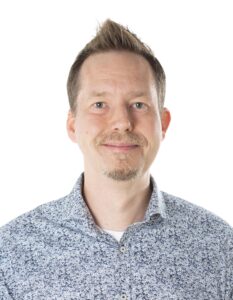
JLOF har pratat med några som är och har varit aktiva inom stiftelsen för att få veta mer om dem och deras arbete. Utan våra fantastiska medarbetare skulle JLOF inte kunna fortsätta vårt arbete. Genom söndagsintervjuerna vill vi uppmärksamma och tacka dem för sitt hårda jobb och den kunskap och engagemang de gett stiftelsen. Först ut är Andreas Bylund!
Andreas Bylund började som ledamot i JLOFs styrlse 2012. I takt med att han insåg att vi står inför stora utmaningar växte hans intresse och engagemang för stiftelsen. När han lärde sig om JLOFs stipendier som inrättats till 20 elever började han tänka på hur svårt det var för flickor att få tillgång till en ordentlig skolgång. Problemet var inte skolorna, utan snarare att det inte fanns några flickor kvar i dessa åldersgrupper i skolorna. Han började då fundera på och diskutera vad som skulle kunna få flickorna att fortsätta sin utbildning upp till secondary school eftersom det är vid 12-13-årsåldern som de avbryter sin skolgång.
Skolgång för alla barn gynnar samhället
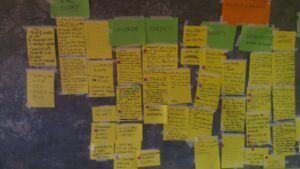 Andreas berättar om att det finns flera olika aspekter som påverkar flickornas skolgång. Dels finns det en personlig aspekt – flickorna vill utbilda sig för att kunna följa sina livsdrömmar efter att de gått ut skolan. Dels finns det en samhällsekonomisk aspekt – kvinnor som har högre utbildning driver på landet och ekonomins utveckling mycket snabbare på grund av den kunskap de fått genom skolan och deras skolarbeten. De som går i skolan lär sig kunskaper mycket tidigare och får ett större intresse av att fortsätta med studierna. Skolgången blir inte bara något ont som snor lektid om dagarna, för dem blir det mer naturligt att engagera sig för att få ett bättre jobb och samhälle. Genom läsning växer även demokratiaspekten fram. Det är genom studierna som barn får ett större intresse för att rösta i politiska val, göra en politisk karriär och påverka samhället genom att styra hur resurser ska användas till sådant som vägar, skola, äldreomsorg och skatter. När dessa utmaningar uppdagades ansökte JLOF om att via Forum Syd få bidrag för att göra en förstudie i Uganda. Förstudien beviljades och JLOF åkte ned till Uganda 2015 för att undersöka vad för problem de kunde se och hur de skulle kunna göra så att alla barn, inte bara flickor, skulle få samma rättigheter till skolgång. Detta inkluderade även de barn som på grund av handikapp och andra svårigheter inte alltid får möjlighet till att gå i skolan. Ett av problemen med att driva denna typ av verksamhet är att det inte är politiskt korrekt i Uganda. Ofta framhävs pojkar och män medan kvinnor och flickor glöms bort. Av denna anledning ville de inkludera alla barn.
Andreas berättar om att det finns flera olika aspekter som påverkar flickornas skolgång. Dels finns det en personlig aspekt – flickorna vill utbilda sig för att kunna följa sina livsdrömmar efter att de gått ut skolan. Dels finns det en samhällsekonomisk aspekt – kvinnor som har högre utbildning driver på landet och ekonomins utveckling mycket snabbare på grund av den kunskap de fått genom skolan och deras skolarbeten. De som går i skolan lär sig kunskaper mycket tidigare och får ett större intresse av att fortsätta med studierna. Skolgången blir inte bara något ont som snor lektid om dagarna, för dem blir det mer naturligt att engagera sig för att få ett bättre jobb och samhälle. Genom läsning växer även demokratiaspekten fram. Det är genom studierna som barn får ett större intresse för att rösta i politiska val, göra en politisk karriär och påverka samhället genom att styra hur resurser ska användas till sådant som vägar, skola, äldreomsorg och skatter. När dessa utmaningar uppdagades ansökte JLOF om att via Forum Syd få bidrag för att göra en förstudie i Uganda. Förstudien beviljades och JLOF åkte ned till Uganda 2015 för att undersöka vad för problem de kunde se och hur de skulle kunna göra så att alla barn, inte bara flickor, skulle få samma rättigheter till skolgång. Detta inkluderade även de barn som på grund av handikapp och andra svårigheter inte alltid får möjlighet till att gå i skolan. Ett av problemen med att driva denna typ av verksamhet är att det inte är politiskt korrekt i Uganda. Ofta framhävs pojkar och män medan kvinnor och flickor glöms bort. Av denna anledning ville de inkludera alla barn.
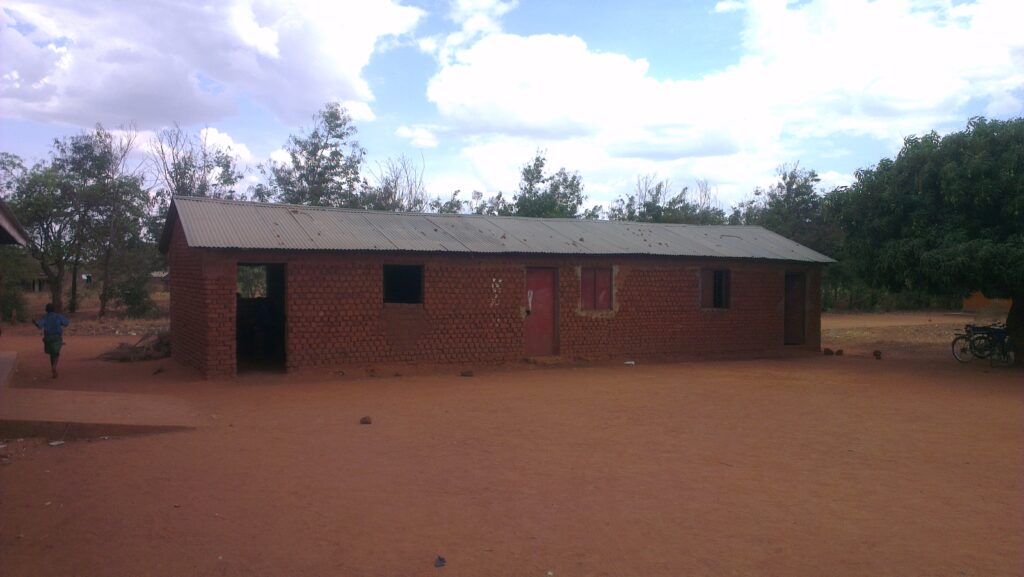
Klimatet i fokus
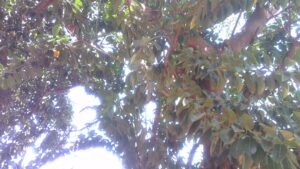
Ett av de problem som lyftes fram under förstudien var planteringen av träd och växter. När träd skövlas försvinner fukt från marken på grund av avdunstningseffekten, vilket gör det svårt för växter att växa där i framtiden. JLOFs förslag på en lösning var att plantera mer, och då helst med frön från växter och frukt som de vet är anpassade till ugandiskt klimat och därför kan sprida sig naturligt. Uganda har en enorm resurs i form av en bördig mark, och JLOF insåg att mycket handlar om att visa samhällena att de har möjligheter att själva förändra sin verksamhet genom att ta tillvara på den fukt i marken som redan fanns där. Det som behövdes var en knuff i rätt riktning.
Byråkratin och dess utmaningar
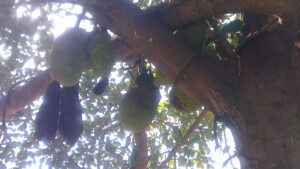 Den största utmaningen är enligt Andreas den svenska byråkratin. Det var en enormt stor och utdragen byråkratisk process för att få finansiering för förstudien. Något som imponerade på honom stort var hans möte med den norska ambassaden i Uganda och hur intresserade de var för JLOFs arbete. Den norska ambassaden fokuserade på små organisationer och vad deras arbete kan uträtta, till skillnad från vissa andra länder som fokuserar på till exempel trädplantering. Att plantera träd är inget fel i sig, men siktar man sig in på det bör man fokusera på plantering av hållbara växter som är anpassade till Ugandas klimat. Andreas berättar nämligen att det finns en tendens av att köpa in fröer från andra länder för att plantera, när man istället kan plantera frön från uppätna frukter som man ju vet tål Ugandas klimat. Det är viktigt att inte införa invasiva arter i Ugandas ekosystem, som redan nu är enormt skört på grund av trädskövling. Eftersom ugandisk kultur bygger mycket på de afrikanska frukterna säger Andreas att det är viktigt att återinföra dem istället för att fokusera på att köpa in växter och frön från andra klimat.
Den största utmaningen är enligt Andreas den svenska byråkratin. Det var en enormt stor och utdragen byråkratisk process för att få finansiering för förstudien. Något som imponerade på honom stort var hans möte med den norska ambassaden i Uganda och hur intresserade de var för JLOFs arbete. Den norska ambassaden fokuserade på små organisationer och vad deras arbete kan uträtta, till skillnad från vissa andra länder som fokuserar på till exempel trädplantering. Att plantera träd är inget fel i sig, men siktar man sig in på det bör man fokusera på plantering av hållbara växter som är anpassade till Ugandas klimat. Andreas berättar nämligen att det finns en tendens av att köpa in fröer från andra länder för att plantera, när man istället kan plantera frön från uppätna frukter som man ju vet tål Ugandas klimat. Det är viktigt att inte införa invasiva arter i Ugandas ekosystem, som redan nu är enormt skört på grund av trädskövling. Eftersom ugandisk kultur bygger mycket på de afrikanska frukterna säger Andreas att det är viktigt att återinföra dem istället för att fokusera på att köpa in växter och frön från andra klimat.
Betydelsen av att underlätta skolgången för både barn och familj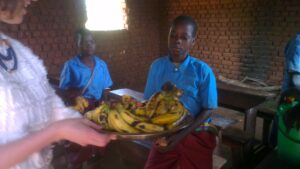
JLOFs besök i skolorna fick dem att inse att det fanns en problematik som vi svenskar inte är vana vid. Introduceringen av skolluncher i skolan gjordes i Sverige eftersom det gav föräldrarna en anledning till att skicka barnen till skolan. I Uganda finns det en problematik med att barnen oftast behövs mer hemma, men om man kan introducera ett mål mat i skolan så är barnen inte en lika stor belastning för den enskilda familjen.
Det fanns även en säkerhetsaspekt som visade sig påverka barnens skolgång. För vissa barn var det farligt att ta sig till skolan, till exempel på grund av farliga djur. Det fanns därför ett behov av att hitta en säkrare skolväg för barnen. Även flera hygienfaktorer spelade in i problematiken med att få barn till skolan. Bristen på vatten vid vissa skolor gjorde så att det inte fanns några tillgängliga toaletter och flickor som hade mens behövde bindor så att de kunde gå till skolan. Allt detta är något som vi i västvärlden tar för givet och därför inte tänker på. När Andreas blev delaktig i JLOF kände han att han hade en möjlighet att hjälpa skolbarnen att komma dit där vi är i västvärlden. Samhällena hade möjligheter att arbeta med problemen själva, allt som behövdes var hjälp för att komma igång med arbetet.
Traumatiska minnen från inbördeskriget
Gulu, regionen som förstudien gjordes i, kämpade fortfarande med minnen från ett inbördeskrig. De märkte att det fanns ett behov av lokalinvånarna att prata om det traumatiska de hade varit med om, hur illa behandlade de blivit och hur de kände att de inte fått upprättelse för deras upplevelser. Det låg som en blockering och det fanns ett behov för dem att få prata om deras upplevelser för att komma vidare.
Ugandas naturlandskap och djurliv
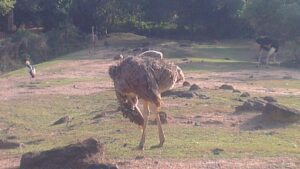
Under förstudien gjorde de även ett studiebesök och fick uppleva Ugandas underbara landskap och fantastiska djurliv. Det är just det finaste som Andreas tar med sig från Uganda – själva naturen i sig. De genomförde även en workshop som avslutades med att JLOF bjöd hela byn på mat. Som ett stort tack ställde byborna till med en stor fest där de spelades musik och dansades. För Andreas kändes det fantastiskt att få vara där på plats och hjälpa dem komma igång med det vidare arbetet.
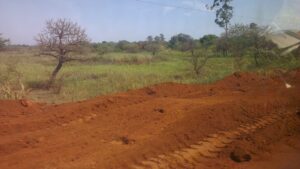 För Andreas var förstudien otroligt spännande och den gav honom enormt mycket insikt i ugandisk kultur. Han fick uppleva samhället på ett helt annat sätt när han var på plats, och det var väldigt lärorikt. Han har många fina minnen därifrån och minns speciellt den gulbruna sanden och det vackra landskapet, som var en stor kontrast från det svenska landskapet.
För Andreas var förstudien otroligt spännande och den gav honom enormt mycket insikt i ugandisk kultur. Han fick uppleva samhället på ett helt annat sätt när han var på plats, och det var väldigt lärorikt. Han har många fina minnen därifrån och minns speciellt den gulbruna sanden och det vackra landskapet, som var en stor kontrast från det svenska landskapet.
Vi på JLOF vill rikta ett stort tack till Andreas som ville dela med sig av sina fantastiska upplevelser han hade när han var aktiv i stiftelsen.
Sunday Interview with Andreas Bylund
 JLOF has talked to people who are and have been active in the foundation to find out more about them and their work. Without our fantastic coworkers, JLOF would not be able to continue our work. Through the Sunday interviews, we want to draw attention to and thank them for their hard work and the knowledge and commitment they have given the foundation. First out is Andreas Bylund!
JLOF has talked to people who are and have been active in the foundation to find out more about them and their work. Without our fantastic coworkers, JLOF would not be able to continue our work. Through the Sunday interviews, we want to draw attention to and thank them for their hard work and the knowledge and commitment they have given the foundation. First out is Andreas Bylund!
Andreas started as a member of JLOF’s board in 2012. As he realized that we were facing major challenges, his interest and commitment to the foundation grew. When he learned about JLOF’s scholarships, which were set up for 20 students, he began to think about how difficult it was for girls to get access to a proper schooling. The problem was not the schools, but rather that there were no girls left in these age groups in the schools. Consequently, he began to think about and discuss what could make the girls continue their education up to secondary school since it is at the age of 12-13 that they interrupt their schooling.
Education for all children benefits society
 Andreas says that there are several different aspects that affect the girls’ schooling. On the one hand, there is a personal aspect – the girls want to be educated to be able to follow their life dreams after they leave school. On the one hand, there is a socio-economic aspect – women with higher education change the country and the development of the economy much faster due to the knowledge they have gained through school and their school work. Those who go to school get knowledge much earlier and have a greater interest in continuing their studies. Schooling does not just become something that prevents playtime during the day, for them it becomes more natural to get involved work for a better job and society. Through reading, the democracy aspect also emerges. It is through their studies that children gain a greater interest in voting in political elections, making a political career and influencing society by controlling how resources are to be used for such things as roads, schools, care for the elderly and taxes. When these challenges were discovered, JLOF applied for a grant via Forum Syd to conduct a pre-study in Uganda. The pre-study was granted and JLOF went down to Uganda in 2015 to investigate what societal problems they could see and how they work so that all children, not just girls, would have the same rights to schooling. This also included those children who, due to disabilities and other difficulties, are not always given the opportunity to go to school. One of the problems with running this type of work is that it is not politically correct in Uganda. Boys and men are often emphasized, while women and girls are forgotten. For this reason, they wanted to include all children.
Andreas says that there are several different aspects that affect the girls’ schooling. On the one hand, there is a personal aspect – the girls want to be educated to be able to follow their life dreams after they leave school. On the one hand, there is a socio-economic aspect – women with higher education change the country and the development of the economy much faster due to the knowledge they have gained through school and their school work. Those who go to school get knowledge much earlier and have a greater interest in continuing their studies. Schooling does not just become something that prevents playtime during the day, for them it becomes more natural to get involved work for a better job and society. Through reading, the democracy aspect also emerges. It is through their studies that children gain a greater interest in voting in political elections, making a political career and influencing society by controlling how resources are to be used for such things as roads, schools, care for the elderly and taxes. When these challenges were discovered, JLOF applied for a grant via Forum Syd to conduct a pre-study in Uganda. The pre-study was granted and JLOF went down to Uganda in 2015 to investigate what societal problems they could see and how they work so that all children, not just girls, would have the same rights to schooling. This also included those children who, due to disabilities and other difficulties, are not always given the opportunity to go to school. One of the problems with running this type of work is that it is not politically correct in Uganda. Boys and men are often emphasized, while women and girls are forgotten. For this reason, they wanted to include all children.

The climate in focus
 One of the problems highlighted during the pre-study was the planting of trees and other plants. When trees are cut down, moisture disappears from the soil due to the evaporation effect, which makes it difficult for plants to grow there in the future. JLOF’s proposal for a solution was to plant more, preferably with seeds from plants and fruit that they know are adapted to the Ugandan climate and can therefore spread naturally. Uganda has an enormous resource in the form of fertile land, and JLOF realized that much is about showing communities that they have the opportunity to change their work themselves by taking advantage of the moisture in the land that was already there. What was needed was a push in the right direction.
One of the problems highlighted during the pre-study was the planting of trees and other plants. When trees are cut down, moisture disappears from the soil due to the evaporation effect, which makes it difficult for plants to grow there in the future. JLOF’s proposal for a solution was to plant more, preferably with seeds from plants and fruit that they know are adapted to the Ugandan climate and can therefore spread naturally. Uganda has an enormous resource in the form of fertile land, and JLOF realized that much is about showing communities that they have the opportunity to change their work themselves by taking advantage of the moisture in the land that was already there. What was needed was a push in the right direction.
The bureaucracy and its challenges
 According to Andreas, the biggest challenge is the Swedish bureaucracy. It was an enormous and protracted bureaucratic process to obtain funding for the pre-study. Something that impressed him greatly was his meeting with the Norwegian embassy in Uganda and how interested they were in JLOF’s work. The Norwegian embassy focused on small organizations and what their work can accomplish, unlike some other countries that focus on, for example, tree planting. Planting trees is nothing wrong in itself, but if you aim for it, you should focus on planting sustainable plants that are adapted to Uganda’s climate. Andreas says that there is a tendency to buy seeds from other countries to plant, when you can instead plant seeds from eaten fruits that you know can withstand Uganda’s climate. It is important not to introduce invasive species into Uganda’s ecosystem, which is already extremely fragile due to deforestation. Since Ugandan culture is very much based on the African fruits, Andreas says that it is important to reintroduce them instead of focusing on buying plants and seeds from other climates.
According to Andreas, the biggest challenge is the Swedish bureaucracy. It was an enormous and protracted bureaucratic process to obtain funding for the pre-study. Something that impressed him greatly was his meeting with the Norwegian embassy in Uganda and how interested they were in JLOF’s work. The Norwegian embassy focused on small organizations and what their work can accomplish, unlike some other countries that focus on, for example, tree planting. Planting trees is nothing wrong in itself, but if you aim for it, you should focus on planting sustainable plants that are adapted to Uganda’s climate. Andreas says that there is a tendency to buy seeds from other countries to plant, when you can instead plant seeds from eaten fruits that you know can withstand Uganda’s climate. It is important not to introduce invasive species into Uganda’s ecosystem, which is already extremely fragile due to deforestation. Since Ugandan culture is very much based on the African fruits, Andreas says that it is important to reintroduce them instead of focusing on buying plants and seeds from other climates.
The importance facilitating schooling for both children and families
 JLOF’s visit to the schools made them realize that there was a problem that we Swedes are not used to. The introduction of school lunches at school was made in Sweden because it gave the parents a reason to send the children to school. In Uganda, there is a problem with the children often being needed more at home, but if you can introduce a meal to school, the children are not as big of a burden for the individual family.
JLOF’s visit to the schools made them realize that there was a problem that we Swedes are not used to. The introduction of school lunches at school was made in Sweden because it gave the parents a reason to send the children to school. In Uganda, there is a problem with the children often being needed more at home, but if you can introduce a meal to school, the children are not as big of a burden for the individual family.
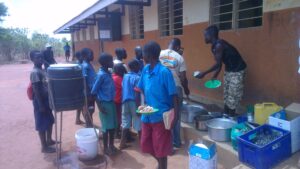 There was also a safety aspect that turned out to affect the children’s schooling. For some children it was dangerous to get to school, for example because of dangerous animals. There was therefore a need to find a safer school route for the children. Several hygiene factors also played a role in the problem of having children at school. The lack of water at some schools meant that there were no toilets available and girls who were menstruating needed sanitary pads so they could go to school. All this is something that we in the western take for granted and therefore do not think about. When Andreas became involved in JLOF, he felt that he had an opportunity to help the school children get to where we are in the western world. The communities had opportunities to work with the problems themselves, all that was needed was help to get started with the work.
There was also a safety aspect that turned out to affect the children’s schooling. For some children it was dangerous to get to school, for example because of dangerous animals. There was therefore a need to find a safer school route for the children. Several hygiene factors also played a role in the problem of having children at school. The lack of water at some schools meant that there were no toilets available and girls who were menstruating needed sanitary pads so they could go to school. All this is something that we in the western take for granted and therefore do not think about. When Andreas became involved in JLOF, he felt that he had an opportunity to help the school children get to where we are in the western world. The communities had opportunities to work with the problems themselves, all that was needed was help to get started with the work.
Traumatic memories from the region’s civil war
Gulu, the region in which the pre-study was conducted, was still struggling with memories of a civil war. They noticed that there was a need for the locals to talk about the traumatic events they had experienced, how badly they had been treated and how they felt that they had not been rehabilitated for their experiences. It was like a blockage and there was a need for them to talk about their experiences in order to move on.
Uganda’s nature and wildlife
 During the pre-study, they also made a study visit and got to experience Uganda’s wonderful landscape and fantastic wildlife. It is the finest thing that Andreas brings with him from Uganda – the nature itself. They also conducted a workshop which ended with JLOF offering the whole village food. As a big thank you, the villagers put on a big party where they played music and danced. For Andreas, it felt fantastic to be there and help them get started with the further work.
During the pre-study, they also made a study visit and got to experience Uganda’s wonderful landscape and fantastic wildlife. It is the finest thing that Andreas brings with him from Uganda – the nature itself. They also conducted a workshop which ended with JLOF offering the whole village food. As a big thank you, the villagers put on a big party where they played music and danced. For Andreas, it felt fantastic to be there and help them get started with the further work.
 Andras says that the pre-study was incredibly exciting and it gave him an enormous amount of insight into Ugandan culture. He got to experience society in a completely different way when he was there, and it was very educational. He has many fond memories from there and especially remembers the yellow-brown sand and the beautiful landscape, which was a great contrast from the Swedish landscape.
Andras says that the pre-study was incredibly exciting and it gave him an enormous amount of insight into Ugandan culture. He got to experience society in a completely different way when he was there, and it was very educational. He has many fond memories from there and especially remembers the yellow-brown sand and the beautiful landscape, which was a great contrast from the Swedish landscape.
We at JLOF would like to thank Andreas who wanted to share his fantastic experiences he had when he was active in the foundation.

